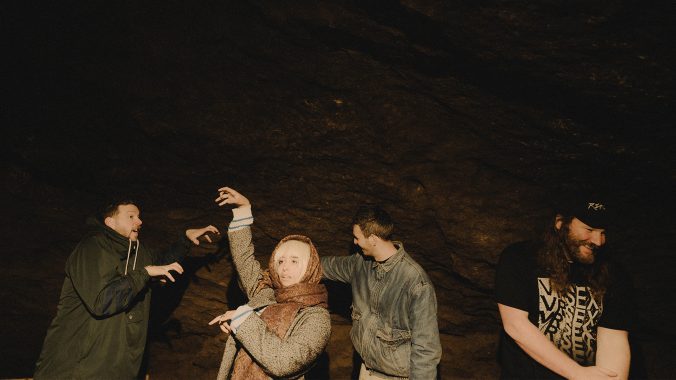Mandy, Indiana Dance Through the Fury
Photos by Cal Moores and Harry Steel
The music of Mandy, Indiana is not for the faint of heart. The band’s intense output over the past three years merges the best of punk, industrial, dance and more into an alarming sonic soup. After self-releasing a handful of singles, the band unveiled their first EP … via Fire Talk in 2021, solidifying their hallmarks: French-language lyrics, thumping beats and gnawing guitars. At some moments frightening and, at others, alluring, Mandy, Indiana is insistent: We are going to make something that we are proud of—that we feel is urgent—and it’s not going to slide under the radar. Mandy, Indiana performs with a creative passion that hurts so good.
Now, the Manchester quartet is on the brink of releasing their long-awaited debut LP, I’ve Seen A Way. As vocalist Valentine (Val) Caulfield notes, “This is the album we needed to make.” While … introduced a broader audience to the band’s vision and sound, I’ve Seen A Way is a deep-dive into the political motivations and instrumental approaches the band explores through their intense sound. Mandy, Indiana are plainly honest about their disaffection and fury; that Caulfield chooses to speak it in her native French reflects an aesthetic and artistic choice: The words lend themselves well to the band’s music, and they entreat English-speaking audiences to dig a little deeper. It’s enlightening to uncover the manifestos she’s delivering.
I’ve Seen A Way is also an exercise in unconventional recording. Guitarist and producer Scott Fair embraced the challenge of recording drums in a dangerously damp Somerset cave. Eccentricities in sound and process are not simply points of pride for the band; they embrace the idiosyncrasies that emerge when recording on-location. What the four-piece produces under duress is as natural as it is weird. That’s the beauty of a group like Mandy, Indiana: It’s obvious that they’re comfortable in the extreme, as if to say “get in, the water’s fine” while lounging in a pool of lava. It’s fun to wrap your mind around.
To help introduce the band to the world, Paste chatted over Zoom with Scott Fair and Valentine Caulfield, each reporting from different locales: Scott called in from his home outside Todmorden—a hotbed of Ufology near Manchester—and Val reported from outside a comedy club in Plouha, where she and her parents just caught a show.
Paste: How did Mandy, Indiana come to be the powerhouse it is now?
Scott Fair: The story I always love telling is that Simon [Catling], the synth player, first encountered Val when he was throwing her out of a club he was working at.
Valentine Caulfield: I’m never gonna get over that!
Fair: I remember Simon telling me about that at some point. He was like, “Val? She might be a bit nuts.” I don’t think he fully grasped the situation at the time.
Caulfield: I don’t think anyone did. The number of people who are aware of that situation is hard. The whole of the UK knows I’m insane. That’s why I’m changing countries.
Fair: Now, the whole world’s gonna know because this record is going to travel far and wide. This record is gonna sell 4-million copies.
What’s the origin of the “Mandy” part of Mandy, Indiana?
Valentine: We changed the name from Gary to Mandy and workshopped it for a long, long time. It came up, and we went for it because that sounded nice.
-

-

-

-

-

-

-

-

-

-

-

-

-

-

-

-

-

-

-

-

-

-

-

-

-

-

-

-

-

-

-

-

-

-

-

-

-

-

-

-








































